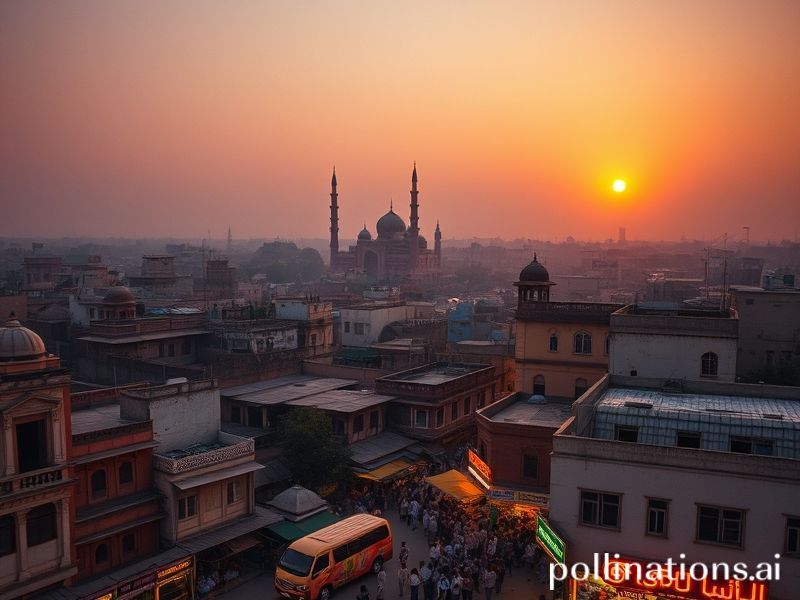Pakistan: Where Geopolitics Goes to Get a Headache and the World Watches With Popcorn
Pakistan: The Unlucky Lottery Ticket That Refuses to Cash Out
By our correspondent in Islamabad, who has learned to keep the whiskey within arm’s reach and the generator closer still.
The world has always treated Pakistan like a scratch card bought at 2 a.m. after a bad breakup: everyone hopes for a jackpot, but the latex keeps flaking off to reveal the same dismal string of zeros. Sitting at the crossroads of China’s Belt-and-Road shopping spree, Iran’s theocratic mood swings, and whatever game India thinks it’s playing on the cricket pitch, the country remains the geopolitical equivalent of a speed bump—annoying, unavoidable, and occasionally capable of shredding your undercarriage.
On the surface, Pakistan’s latest chapter reads like a Netflix series the algorithm keeps recommending you finish: inflation above 30 %, rupees that melt faster than gelato in July, and Imran Khan alternating between prison selfies and sermon-length tweets. Yet beneath the chaos lies a more unsettling truth: when Pakistan sneezes, the global balance of power catches a migraine. The IMF has already dispatched its sternest accountants, China is quietly extending loans the way a bartender extends tabs to the town drunk, and Washington keeps wondering whether Islamabad’s nuclear toys are padlocked or merely kept on a wobbly IKEA shelf.
The strategic stakes are almost comically oversized. One-fifth of the planet’s population lives within a cheap regional flight of Lahore’s street kebabs. The Indus River, a waterway so over-subscribed it should have its own frequent-flyer program, irrigates crops that feed Gulf sheikhs and Manchester curry houses alike. Meanwhile, Gwadar Port—Beijing’s warm-water daydream on the Arabian Sea—promises to shave two weeks off the shipping route from Shenzhen to Rotterdam, provided the surrounding province isn’t on fire or under siege by separatists who’d rather be anywhere but Pakistani.
Climate change, that great equalizer of misery, has turned the country into a preview reel for the apocalypse. Last year’s monsoon floods submerged a third of the nation, displaced eight million people, and gifted the planet a viral image: a double-humped camel serenely gliding past a Pizza Hut sign like some biblical Uber. At COP summits, Pakistani diplomats now joke—darkly, over lukewarm canapés—that they are “the world’s laboratory for disaster management, minus the lab coats or the management.”
Then there is the population bomb: 240 million souls, half under the age of 25, all furiously Googling “Canada Express Entry.” The brain drain is so advanced that Karachi’s best cardiologist now practices in Cleveland, while the remaining surgeons operate by flashlight during the daily six-hour power cuts. The upside? Remittances—those sweet, guilt-infused wire transfers from sons driving Toronto taxis—keep the current-account deficit from hemorrhaging completely, proving that guilt remains the most reliable export in the developing world.
Yet Pakistan is not merely a cautionary tale; it is also a control experiment in what happens when democracy, militarism, and tribal feudalism are locked in a three-way cage match. The army, whose budget line is a state secret wrapped inside a national enigma, still believes it can choreograph politics the way Bollywood choreographs weddings: loud, sentimental, and always ending with a dance number. Civilians, for their part, have perfected the art of voting for the same landlord every five years while cursing the landlord every single day. Outsiders watch this loop with the detached fascination of tourists observing a cobra and mongoose tango—impressed by the choreography, relieved it’s happening behind reinforced glass.
Global implications? Start with Afghanistan next door: a Taliban-run sandbox where every regional power dumps its surplus jihadists like expired fireworks. Pakistan, having once sponsored the Taliban, now finds itself their favorite hostage negotiator—an irony not lost on anyone who remembers the 1980s. Add the simmering Kashmir dispute (a mountain valley so beautiful both countries prefer to mine it rather than Instagram it), and you have the rare territorial conflict that could go thermonuclear over a traffic jam.
In the end, Pakistan teaches the world a lesson nobody asked for: that geography is destiny, but destiny is negotiable if you have enough cousins in Dubai willing to front the cash. The country will almost certainly muddle through, because muddling is its superpower. The rest of us will continue rubbernecking, half horrified, half entertained, secretly grateful that our own national disasters come with better lighting and shorter power outages.







